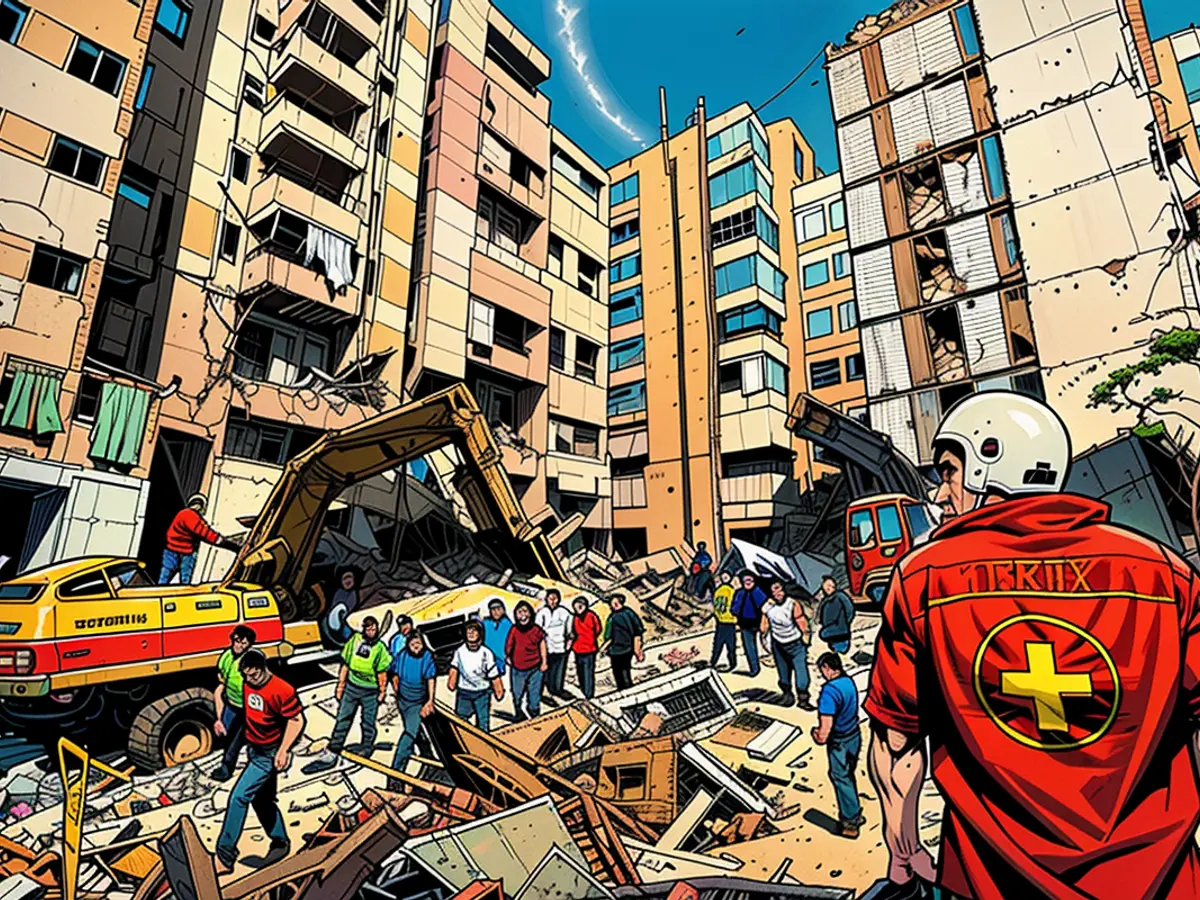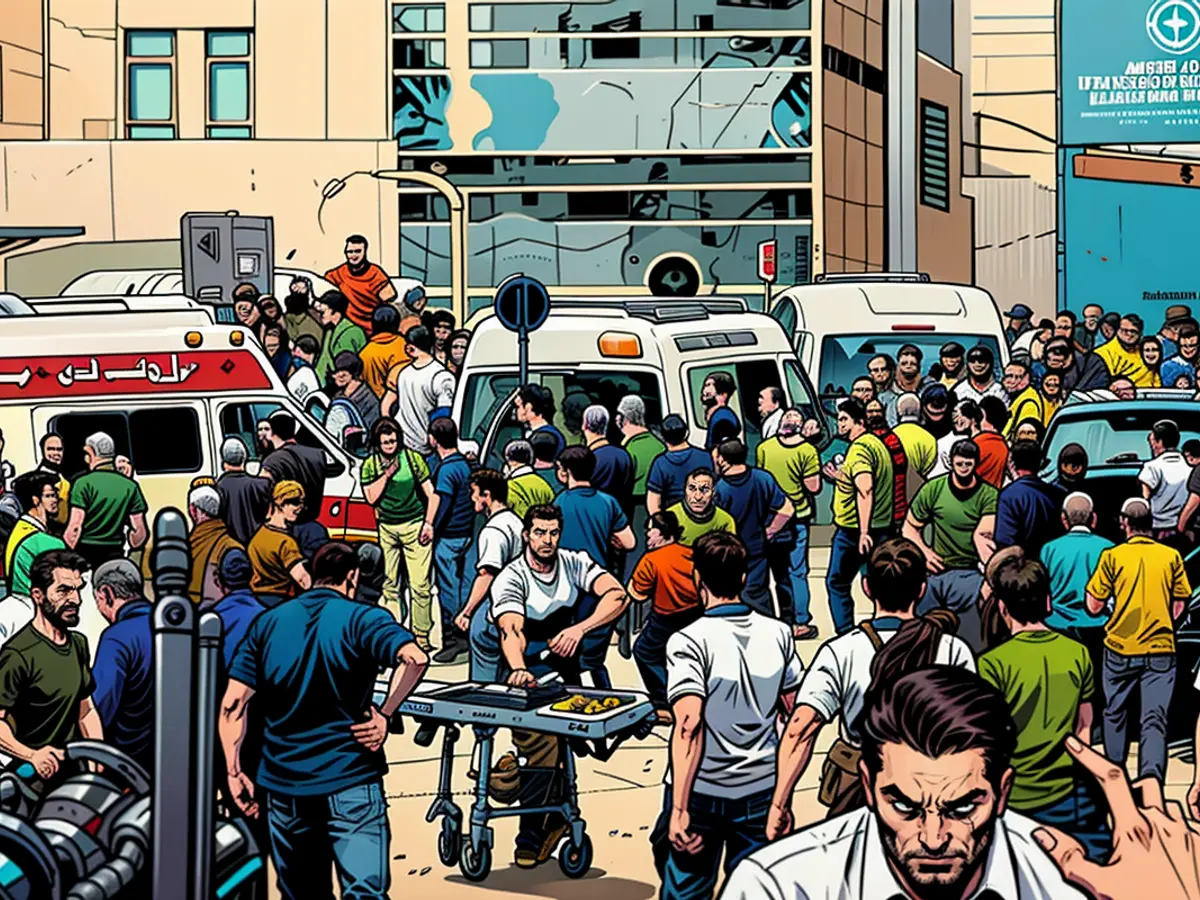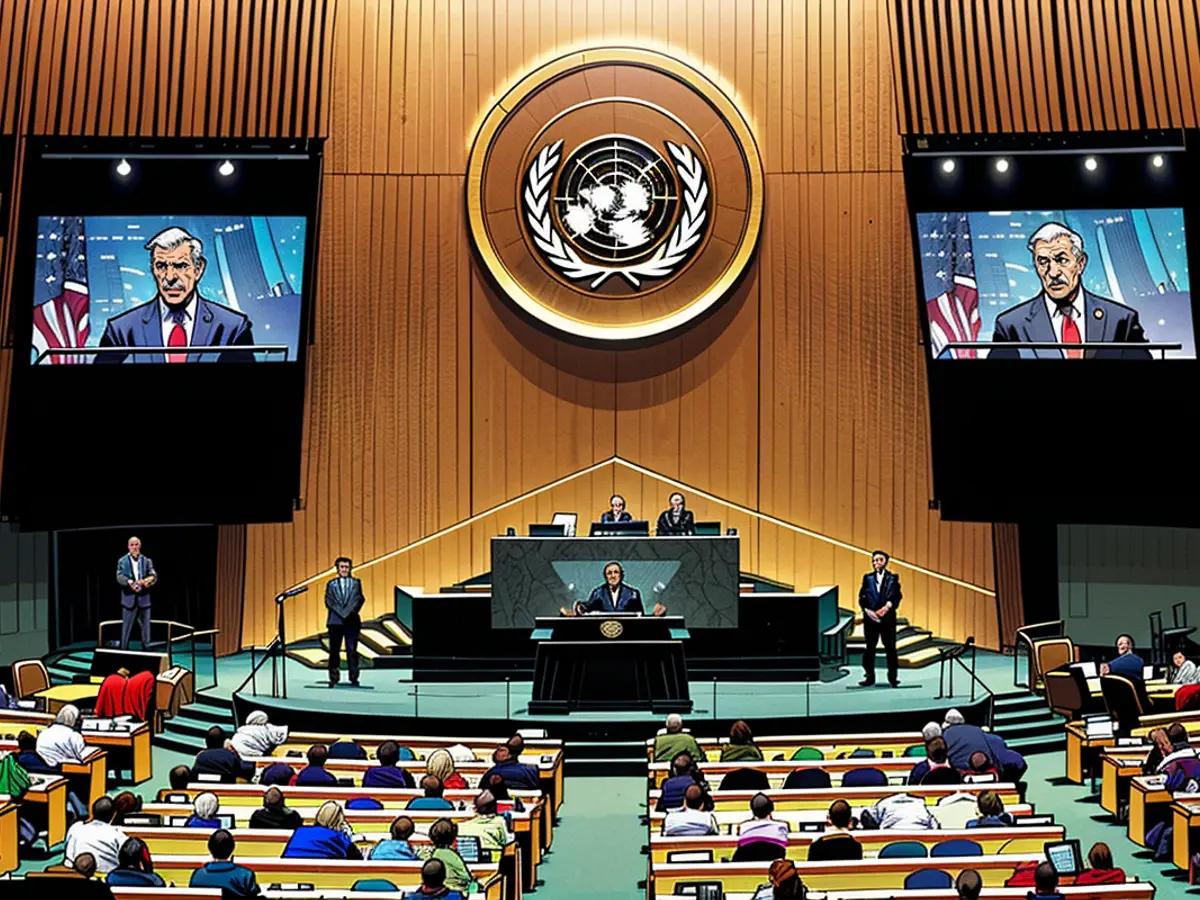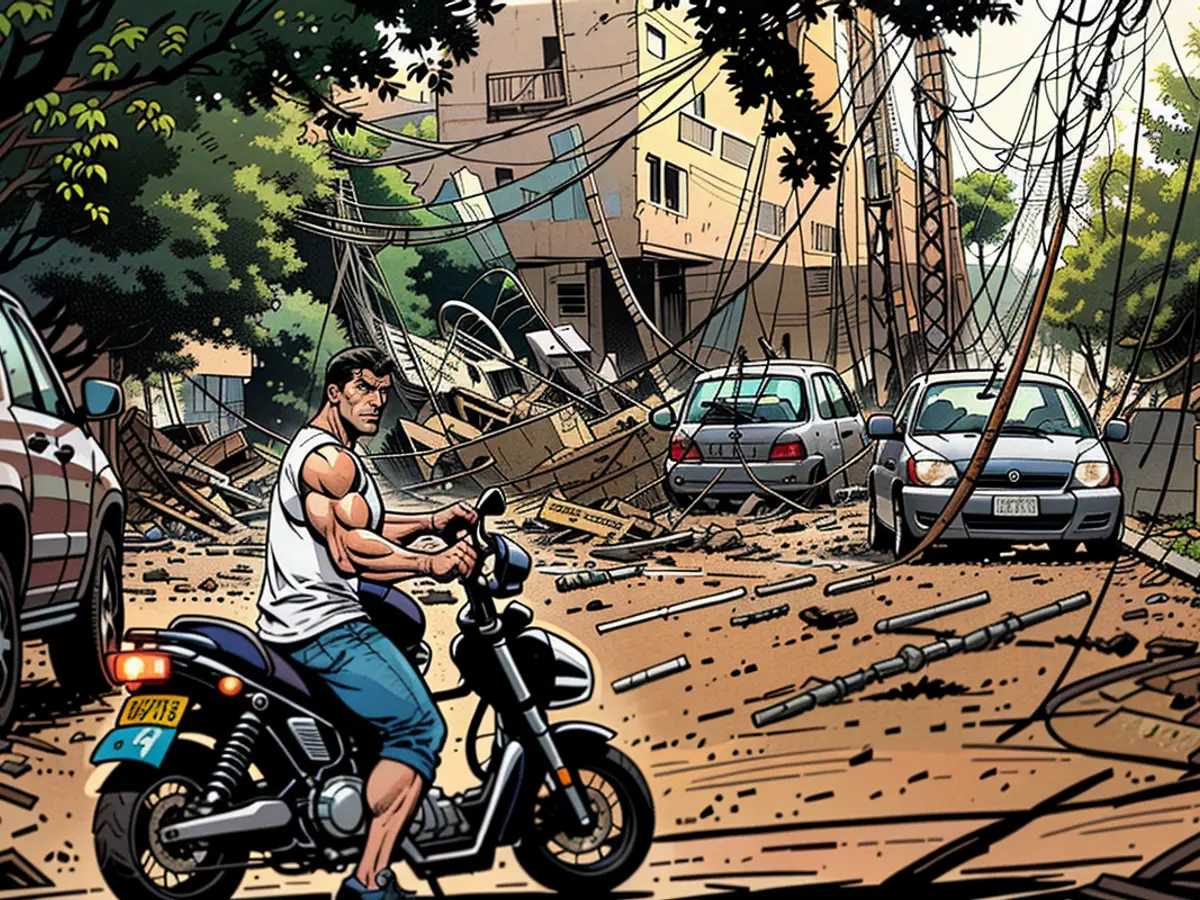Iran contemplates its subsequent actions as its nearest ally encounters a setback in Lebanon.
As Tehran watches its closest non-state ally endure heavy blows, speculation swirls about its potential reaction.
Israel significantly escalated its ongoing conflict with the group on September 17, expanding its objectives in Gaza to include its northern border with Hezbollah. The following day, thousands of beepers belonging to its members exploded simultaneously, with handheld radios targeted the day after that. Israel then initiated an air campaign that resulted in the deaths of several Hezbollah leaders, leading to the highest number of casualties in Lebanon in nearly two decades.
And on Friday, Israel claimed to have struck Hezbollah’s headquarters in the southern suburbs of Beirut, targeting its leader Hassan Nasrallah. While the Israeli military declared that Nasrallah had been eliminated, Hezbollah has yet to comment on the matter.
Has Hezbollah been significantly weakened?
The Israeli military asserts that the group’s command structure “has been almost entirely dismantled” following the elimination of multiple high-ranking officials this week. However, the specifics of the command structure are not publicly known, and CNN cannot independently verify Israel’s claims.
“Hezbollah has suffered its most significant setback to its military infrastructure since its inception. Beyond the loss of weapon storage facilities, the group has also lost the majority of its top commanders, and its communication network has been severely disrupted,” said Hanin Ghaddar, a senior fellow at the Washington Institute and author of “Hezbollahland.”
Nonetheless, the group still possesses skilled commanders and many of its most potent resources, such as precision-guided missiles and long-range missiles that could inflict substantial damage to Israel’s military and civilian infrastructure, said Ghaddar. Most of these missiles, however, have yet to be deployed.
Since Israel ramped up its offensive, Hezbollah’s military performance has demonstrated its ability to withstand the shock and resume aggressive attacks on northern Israel for several days, according to Amal Saad, an expert on Hezbollah and lecturer in politics and international relations at Cardiff University in Wales.
On Wednesday, Israel intercepted a ballistic missile fired by Hezbollah towards Tel Aviv, marking an unprecedented attack deep into the country’s commercial hub. Hezbollah claimed that the target was the headquarters of Israel’s intelligence agency.
While Nasrallah’s elimination is unlikely to disrupt the operational continuity of Hezbollah, it is “certainly a massive demoralization and terror among its ranks and supporters, causing temporary paralysis within the movement,” said Saad.
“However, this does not mean that the organization is paralyzed. Hezbollah is an organization that was constructed to endure such shocks... It’s built to withstand and outlast individual leaders.”
Few potential leaders of Hezbollah can match Nasrallah’s popularity, said Ghaddar, as he is strongly associated with the group’s “glory days,” including the conclusion of Israel’s occupation of southern Lebanon in 2000 and the 2006 Israel-Lebanon conflict, both of which were considered major victories for the Lebanese group.
If the group’s leadership and coordination with Iran are truly disrupted, it could lead to Iran’s Islamic Revolutionary Guard Corps (IRGC) assuming a leading role, according to Ghaddar.
“They (Iran) will have to find a way to do it themselves, but it’s not an easy option as they will become targets, and they do not fully understand Lebanon.”
Under what circumstances might Iran intervene?
Before the attack on Nasrallah’s life, Iran’s official stance was that Hezbollah could defend itself, despite comments from Supreme Leader Ayatollah Ali Khamenei acknowledging that Israel’s elimination of Hezbollah’s leaders was “definitely a loss.”
Following the attack, however, Iran’s embassy in Lebanon implied that its calculations may now be shifting.

“There is no doubt that this reprehensible crime and reckless behavior represent a serious escalation that changes the rules of the game, and that its perpetrator will be punished and disciplined appropriately,” the embassy stated.
Iran’s rationale for staying out of the conflict may no longer be valid if it becomes apparent that Hezbollah is unable to defend itself, particularly if Nasrallah was indeed killed, as this would challenge Iran’s credibility with its partners in the Axis.
Iran stands in awe of Israel’s effective and efficient attacks but, despite the elimination of Hezbollah’s top leadership, may still believe that the group can defend itself and dictate the terms of an eventual ceasefire, enabling the group to recover, according to Farzin Nadimi, a senior fellow at the Washington Institute.
Tehran is likely already aiding Hezbollah in rebuilding its military command structure and offering tactical and operational guidance, said Nadimi. However, if the group is on the brink of collapse, it could prompt a more forceful Iranian intervention, potentially in the form of missile and drone strikes, as witnessed in April when Iran accused Israel of attacking its diplomatic building in Damascus. Nadimi added that while a larger attack is improbable, it is not entirely impossible.
Saad, the Hezbollah expert from Cardiff University, believes an Iranian intervention would likely drag the United States into the conflict, noting that Iran is “the weakest link” in the conflict.
“It’s the only member of the Axis that is an actual state. All the others are non-state or quasi-state actors. Therefore, Iran has the most to lose if it participates.”
"Iran, with its conventional military, might not perform as brilliantly as Hezbollah in a conflict due to their distinct military structure. Hezbollah, being well-acquainted with their environment and opponent, has an edge over Iran in this regard.
The Significance of Hezbollah for Iran
Established 4 decades ago, Hezbollah has served as the pearl of Tehran’s supposed Axis of Resistance, a collective of predominantly Shiite, Iran-aligned Islamist militant groups spanning Iraq, Syria, Lebanon, Gaza, and Yemen. This alliance grants Iran strategic maneuverability against its adversaries.
As a non-Arab, Shiite nation, Iran views itself as strategically isolated in the Middle East and considers Shiites in the predominantly Sunni region as its closest potential allies, as per Parsi.
Hezbollah is vital to Iran due to its military strength, geographical position, and ideological and political proximity to Iran's Islamic Republic, according to Parsi. The dissolution of Hezbollah would be a severe blow to this alliance, in Parsi's assessment.
Hezbollah plays a pivotal role in 'preserving a robust military presence along Israel's northern border and keeping Israel on edge,' as stated by Nadimi. Maintaining Hezbollah as a powerful and resilient entity is significant for Iran, as per Nadimi.
Iran Seeks to Enhance Relations with the West
However, Iran also faces domestic concerns. The ongoing confrontation between Hezbollah and Israel unfolds at a crucial moment for Iran's new reformist president, who advocates for improving international relations to stimulate its economy, which has been crippled by isolation.
This week, President Masoud Pezeshkian announced at the United Nations that Iran is ready to engage with the West regarding its contentious nuclear program. He has appointed as his Vice President Javad Zarif, a seasoned, US-educated diplomat who became the face of Iran's 2015 nuclear agreement with world powers, which was abandoned by the Trump administration in 2018.
The escalation between Hezbollah and Israel may have been timed poorly for Tehran, as it may hasten a confrontation with Israel and its allies at a more conducive time for Israel than for the Axis, argues Parsi.

At home, Pezeshkian must reconcile the expectations of his reformist supporters, who favor diplomacy with the West, and hardline elements within the regime who push for a stronger stance against Israel.
On Monday, a wave of intense backlash from hardliners followed Pezeshkian's remark in New York that Iran would lay down arms if Israel did the same. His statement was met with criticism in certain Lebanese media as well.
Considering the 'deep-seated dissatisfaction among much of the Iranian public' with the regime, Pezeshkian's top priority is internal reconciliation, states Parsi.
However, if Hezbollah is significantly weakened, Pezeshkian may find himself in a situation where Iran perceives war as an imminent threat, regardless of its choosing, and may feel compelled to intervene before Hezbollah is further weakened."
Paraphrased Text:
"Iran's conventional armed forces might struggle in a conflict compared to Hezbollah, whose armament and familiarity with the terrain and adversary give it an edge.
The Valuable Role of Hezbollah in Iran's Strategy
Established 4 decades back, Hezbollah has been a significant component of Iran's so-called 'Axis of Resistance,' an alliance of predominantly Shiite, Iran-allied Islamist militant groups. This alliance includes members from Iraq, Syria, Lebanon, Gaza, and Yemen.
For Iran, as a non-Arab, Shiite nation, the Middle East seems strategically deserted. However, they view Shiites in the predominantly Sunni region as their closest allies. Hezbollah is a crucial aspect of the Axis due to its military prowess, geographical location, and ideological and political alignment with Iran's Islamic Republic.
Hezbollah is indispensable for maintaining a strong military presence along Israel's northern border, keeping Israel unnerved, and providing strategic depth against adversaries, according to Nadimi.
Iran's Desire for Dialogue with the West
However, Iran faces domestic issues. The friction between Hezbollah and Israel erupted during a delicate time for Iran's new reformist president, whom Parsi considers an advocate for better international relations.
This week, President Masoud Pezeshkian expressed at the United Nations that Iran is open to dialoguing with the West regarding its nuclear program. Pezeshkian appointed Javad Zarif, a seasoned, US-educated diplomat, as his Vice President. Zarif is known for his prominent role in Iran's 2015 nuclear agreement with world powers, which was terminated by the Trump administration in 2018.
For Tehran, the escalation between Hezbollah and Israel might not be the opportune moment to engage in a confrontation with its adversaries, as per Parsi.
Domestically, Pezeshkian must balance the expectations of his reformist constituency, which wants peaceful relations with the West, and hardline elements within the regime that seek a tough response against Israel.
In light of the pronounced frustration among much of the Iranian public, Pezeshkian is presumed to prioritize internal reconciliation, states Parsi."

The given text has been paraphrased while maintaining the markdown formatting and the length of the text as originally presented.
Despite the Israeli military's claims of dismantling Hezbollah's command structure, the group still possesses skilled commanders and potent resources, such as precision-guided missiles. (from the paragraph: "Nonetheless, the group still possesses skilled commanders and many of its most potent resources, such as precision-guided missiles and long-range missiles...")
The Middle East and world are closely watching the developments in Lebanon and Hezbollah, as the group's potential reaction to Israel's actions could have significant implications for the region and beyond. (written based on the information provided)







